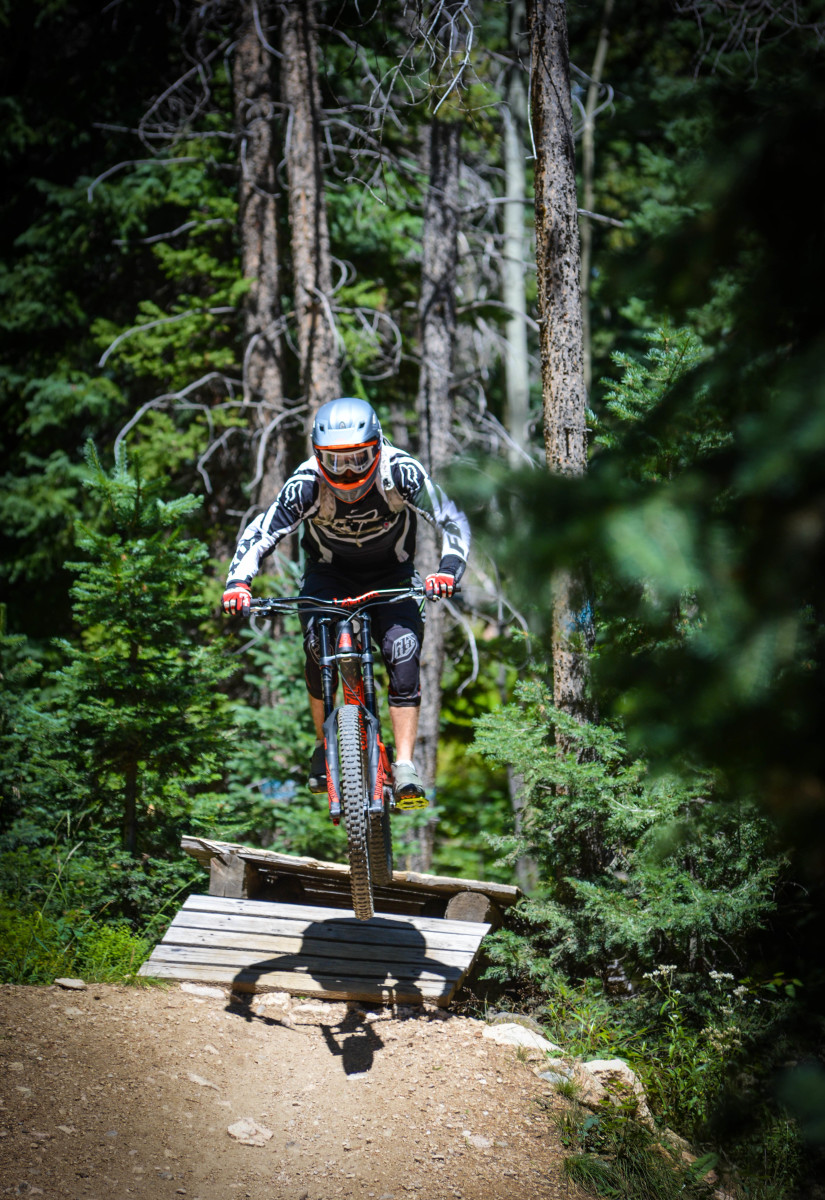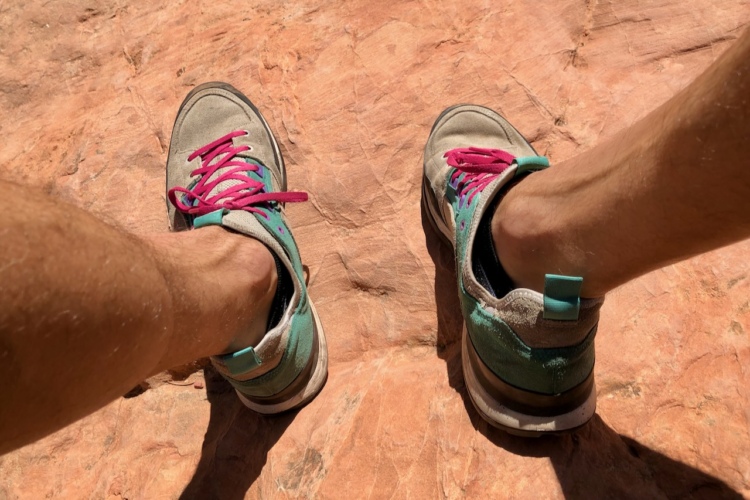
The direct-to-consumer company Commencal is not only giving larger manufacturers a run for their money on race day, but is building strong, attractive bikes for and around pro riders for thousands less than their competitors. The Commencal SUPREME DH V4 Race is no exception: built to win races in any terrain, for a not-absurd chunk of change. This, bike, however, is wholly unique from the previous Supreme DH, with a new take on the high pivot design (where the pivot is mounted high above the bottom bracket).
Without question, it is the suspension that will garner the most interest from other riders when you’re out shredding. It looks like nothing else on the mountain, and it is obvious that engineers and riders at Commencal went to extraordinary lengths to perfect the high pivot, and make it clean. There are other high pivot designs out there, mostly on custom or fringe bikes, and they look Frankenstein-ish. Not the Commencal. The chain is cleanly routed through an integrated (hidden) pulley in the seatstay, with sealed cartridge bearings. Unlike more conventional designs, the purpose of this pivot/pulley is to retard chain growth–and resultant chainslap–from the even larger wheel path created by the 220mm of travel in the rear-end.
Bottom line: gobs of travel, and a very quiet bike.

In addition to the suspension linkage/high pivot, Commencal also designed the bike around the 27.5in wheel platform, which provides a great blend of maneuverability and roll-ability on the DH course. Bigger wheels mean that it can soak up some of the chunkier terrain better but maintain cornering prowess. The center of gravity is kept low because the lower linkage is tucked just above the press fit BB107 bottom bracket, held together by a variety of proprietary hardware.
Engineers went the extra mile to make this bike as versatile as possible, designing the frame so that riders can swap dropouts to add or subtract length, swap different headset cups to change the reach length (with the reach already being increased over previous models), rubber bits to protect the chain in the pivot pulley, integrating a rear fender and downtube protector, placing thick rubber bump stops on the top tube, and providing clean internal cable routing. It is a very interesting bike to look at once you stop and take the time to inspect all that went into it.

Specs
|
Testing
This bike was tested in Colorado at three bike parks over the course of the summer: Trestle (Winter Park), Evolution (Crested Butte), and Sol Vista (Granby), which was a great mix of gnar, speed, bumps, jumps, rollers, berms, sand, wooden features, and tight, rocky forest sections. Conditions were loose with a mix of dirt and kitty-litter; I did not test this bike in the mud or in wet conditions. I rode it on smooth flow trails like Rainmaker, and more sinister runs like Psycho Rocks.

Handling and Component Check
As I stated above, one of the first things that you’ll notice about the DH V4 is how quiet it is compared to other bikes. On fast and smooth downhill runs, all you can hear is the wind and the drowning doppler effect of the rear hubs, and on nasty rocky and rooty sections there is no chain slap. None. Nada.
Very, very impressive.

The suspension was well balanced. The Boxxer was setup perfectly, and the bike had a good amount of squish which ramped up quickly with a firm end stroke. The fork seemed a little stiffer than I had hoped deep into its travel, something consistent with more modern DH setups, and after using 100% of the travel on some bigger jumps (and screw ups), I realized that the fork was setup just right. The fact that it gets stiffer allows you to control and steer the bike better in chunkier terrain, especially after the suspension gracefully soaks up the chunder down under in the first half of its travel. The more I rode it, the more I got used to it… and appreciated that it fixed my ugly.

One of the most amazing aspects of the Supreme is how low this bike gets as you push the travel to its limits. The 63-degree head angle and scissor-like suspension push the center of gravity down and get you low, low, low in corners and on landings. The traction is amazing, and that long wheel path provides a lot of confidence when the suspension is working itself hard.
The overall geometry of this bike favors a committed rider and a forward stance. The few times I got too far back on this bike, either from a roller or a steep drop, the Supreme let me know it. After five days of riding a few steeper runs, I not only rubbed a three-inch hole in the seat of my pants, but had to raise the seatpost up an inch because the tire was wearing away the rear portion of the saddle. Once I started leaning forward more on this bike, especially in berms and off drops with buttery transitions, it rewarded me, and ultimately made me a more committed rider. Thanks, Supreme!

The Ride Alpha cockpit (bars, stem, seatpost, saddle) is set for an average rider, and other than saddle height adjustment, I made no adjustments to the stock setup, even with a 50mm stem. Wide bars, short-ish stem, longer reach, and an average stack make this bike feel comfy to the bell curve of DH riders like me, but with room on both sides to make adjustments to accommodate any rider on the “medium” frame… especially with the frame adjustments that you can make. As a bonus, the overall look of the Alpha cockpit was clean–a very nice-looking setup–one you’re proud to have on the bike without spending a fortune or swapping out parts once you buy it.

The 200mm fork took a little getting used to, but I did not have to touch it once it was broken in a little. It was quiet and handled both small and large bumps with ease. The 220mm rear shock, too, was flawless, and adjusting sag was a snap (there are helpful tutorials on how to do this on the Commencal website if you are not familiar with how to adjust sag on a coilover shock). There was very little pedal kickback thanks to the suspension design, and the 200mm/220mm combo felt like they were made for each other.

The Avid Code R 4-piston brakes were clearly designed for a bike like this. For heavier riders like me, on a bike that weighs 40lbs and uses its mass to charge hard at insane speeds, I appreciated the stopping power of the Codes time and time again. After darn-near abusive braking while coming in hot on some corners, they never let me down. Even after weeks of riding, they felt every bit as solid as the first ride–even with worn pads.

E13 Rims laced to Ride Alpha DH hubs using Nylock spokes made for a near-bombproof wheel. I had a few “umph” moments and a few manky landings, and these wheels did not disappoint. I am honestly surprised I didn’t blow up the rear a couple of times, but they are still true and quiet.

Commencal elected to spec the Maxxis Minion DHR II 2.40/60 TPI/3C Maxx Grip both front and rear, which were fast rolling with a ton of grip. Still, after only a few days at the parks, the center tread on the rear was starting to look haggard due to the tacky compound. They are an expensive tire, which is impressive as an OEM spec, but I would still replace the worn tires with the same DHR II just to have the traction these tires provided. I ran tubes for the entire testing period.

While the weight is on par with its competitors for an aluminum bike, this particular bike is overbuilt. That is a good thing, but it will never be a 32lb bike no matter now many parts you take off or change on it. Weight can be your ally, if you learn how to use it, but if you are looking for a feathery race bike, the DH V4 Race may not be for you. This bike was built to rally and survive your miscalculations in the most heinous of situations.

Continue reading on page 2 for possible downsides, more photos, and my final take.





















0 Comments